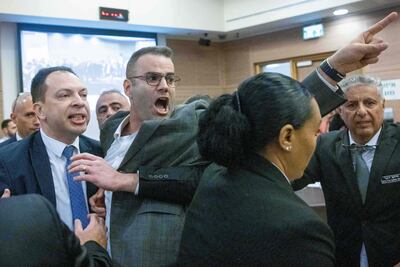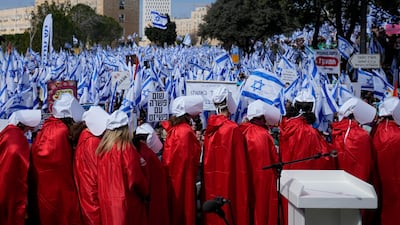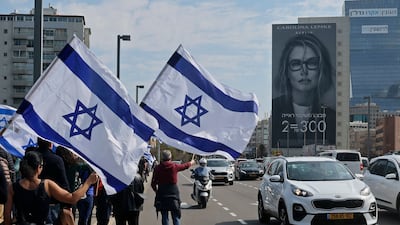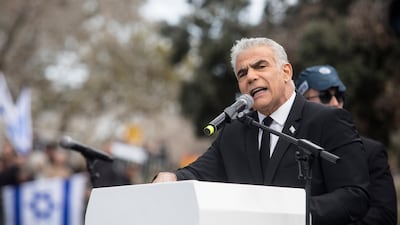At least 70,000 demonstrators gathered outside Israel’s parliament on Monday to protest against the first round of voting on legal reforms that critics say will fundamentally alter the nature of democracy in the country.
Groups from across Israel’s political spectrum attended the demonstration, bringing areas surrounding the Knesset to a standstill in one of the most intense signs yet that government policy is dividing the country.
The reforms proposed by the country’s new coalition include an “override clause” that would allow parliament to re-legislate by simple parliamentary majority any laws that the Supreme Court strikes down.
Other reforms include giving the administration control over the selection of judges, and allowing ministers to select their own legal advisers, ending a previous arrangement whereby such counsel would come from the Justice Ministry.
The effects of the reforms would not only be political, and academics, teachers, medics and other professionals held up signs during the protest outlining what the reforms would mean for their sectors.

Erel Margalit, founder of Jerusalem Venture Partners, one of Israel’s leading venture capital firms, called the protests “extremely moving”.
“It’s probably the biggest demonstration of the tech industry ever,” he said.
“Over the past 25 years, we in the high-tech industry have been builders at home and abroad. An open society was critical to that. Many of these builders that are leading Israel’s economy are now saying, 'don’t change our ways of life'.”
“Democracy is at the heart of what Israel is: the ability to have Jews and Arabs, men and women work together.”
There was an intense patriotic fervour present in the crowd, with a sea of Israeli flags stretching throughout Jerusalem’s political district.

On Saturday, a sixth weekly protest against the reforms drew more than 200,000 people, marking the highest turnout since the demonstrations began.
The protest movement is keen to stress its cross-party nature, as Israel comes to terms with the formation of its most right-wing government in its history, led by Prime Minister Benjamin Netanyahu.
Domestic pressure on his administration over the proposals is growing. According to a poll released on Friday by Israel's Channel 12, only one in four Israelis support the proposed legislation.
In a speech on Sunday night, Israeli President Isaac Herzog issued a desperate call for compromise, saying the country was on the verge of “societal and constitutional collapse”.
While the atmosphere among protesters was overwhelmingly one of unity on Monday, old divisions remained stark.
Daphna, a teacher, stood by a group of pro-Palestinian organisations making the case that Palestinian rights were key to the health of Israeli democracy.
“We relate to the title of this demonstration, but we say don’t forget that the basis of this corruption is that we are sitting on the neck of another nation,” she said.
“Some people come up to as and say, 'why are you making the connection'. One man even took a placard from my group and tore it up in front of us. I tell them, 'do human rights insult you?'”
Inside the parliament, a tense first round of voting on the legislation was under way, during which a number of politicians were removed from the room.












